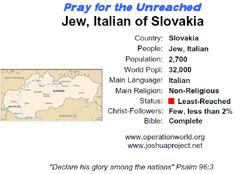OCTOBER 26- TODAY’S READING FROM THE ONE YEAR BIBLE- JEREMIAH 49:23-50:46; TITUS 1:1-16; PSALMS 97:1- 98:9; PROVERBS 26:13-16
TODAY’S READING FROM THE OLD TESTAMENT- JEREMIAH 49:23-50:46;
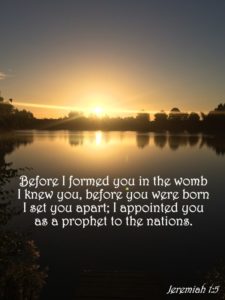 Before Jeremiah was born, he was commissioned by God to prophesy to the nations (Jer 1:5). In Chapter 46, the first of the prophecies to the surrounding heathen nations was recorded regarding Egypt. This was followed by prophecies about the fall of Philistia, Moab, Ammon, Edom, and now Syria, which Nebuchadnezzar would conquer in 605 BC.
Before Jeremiah was born, he was commissioned by God to prophesy to the nations (Jer 1:5). In Chapter 46, the first of the prophecies to the surrounding heathen nations was recorded regarding Egypt. This was followed by prophecies about the fall of Philistia, Moab, Ammon, Edom, and now Syria, which Nebuchadnezzar would conquer in 605 BC.
Prophecies are given to Damascus (49:23-27), Kedar, Hazor (49:28-33), and Elam (49:34-39).
There is a message of hope given to Elam:
Jeremiah 49:39 39 ‘But it will come about in the last days that I will restore the fortunes of Elam,’ declares the LORD.
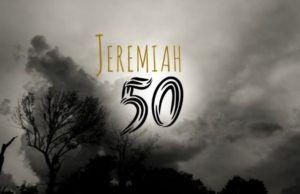 Chapter 50 begins the final prophecy, the prophecy concerning Babylon.
Chapter 50 begins the final prophecy, the prophecy concerning Babylon.
We read in this prophecy the sense of pity that the Lord has for His people. He also recognizes the failure of their leaders:
Jeremiah 50:6 6 “My people have become lost sheep; Their shepherds have led them astray. They have made them turn aside on the mountains; They have gone along from mountain to hill and have forgotten their resting place.
Do we remember the resting place that God has provided? Jesus said, “Come unto me… and I will give you rest” (Matthew 11:28). He told His disciples to ‘abide’ in Him and assured them that apart from Him they could do nothing’ (John 15:5). Do not forget your resting place!
The Babylonians, also known as the Chaldeans, were God’s instruments in providing the needed chastisement for Judah. Yet the Babylonians would be conquered in 539 BC by the Medo-Persians (Daniel 5:30-31).
Daniel 5:30-31 30 That same night Belshazzar the Chaldean king was slain. 31 So Darius the Mede received the kingdom at about the age of sixty-two.
Because of the heritage of Babylon, the city becomes a symbol of the spiritual forces at work in an anti-Christ world system of evil.
The words in Jeremiah 50:8 remind us of exhortations in the New Testament to flee the influence of the anti-Christ world system. We are told to ‘love not the world’ (1 John 2:15).
Jeremiah 50:8 8 “Flee from the midst of Babylon, and go out of the land of the Chaldeans, and be as male goats before the flock. (ESV)
Revelation 18:4 4 Then I heard another voice from heaven saying, “Come out of her, my people, lest you take part in her sins, lest you share in her plagues.”
This prophecy contains some sad summaries in the history of God’s covenant people:
Jeremiah 50:17 17 “Israel is a scattered flock; the lions have driven them away. The first one who devoured him was the king of Assyria, and this last one who has broken his bones is Nebuchadnezzar king of Babylon.”
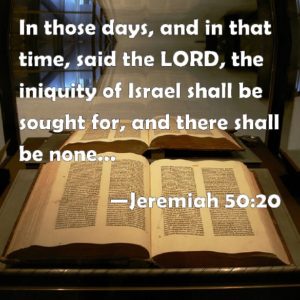 There is also this mind-boggling prophecy of grace:
There is also this mind-boggling prophecy of grace:
Jeremiah 50:20 20 ‘In those days and at that time,’ declares the LORD, ‘search will be made for the iniquity of Israel, but there will be none; and for the sins of Judah, but they will not be found; for I will pardon those whom I leave as a remnant.’
Jeremiah predicts a destruction of Babylon that will be complete, as complete as the destruction of Sodom and Gomorrah. Babylon has been destroyed and rebuilt numerous times. The Assyrian King Sennacherib thought he destroyed it forever in 689 BC. Reconstruction began by his son, Esarhaddon, and soon it became an important city of the Assyrian Empire until Babylon rebelled against Assyrian rule in 626 BC. Babylon became a separate Empire and grew in strength. In 605 BC, Nebuchadnezzar came to power, and Babylon became the leading power in the world. Cyrus of Persia overthrew his grandfather, the King of Media, and formed the Medo-Persian Empire. In 539 B.C., his army captured Babylon without a battle, and Darius the Mede was put in charge. Yet Babylon continued to exist after Cyrus conquered it. In 482 B.C. Persian King Xerxes put down a Babylonian rebellion and took away the idol of the Babylonian god, Marduk. He also destroyed some of the city walls. When Alexander the Great of Greece defeated the Persians 150 years later, much of the city of Babylon was still in ruin, yet inhabited. After Alexander’s death, Seleucius I gained control of Babylonia. He built a new city nearby on the Tigris River called Seleucia. He ordered that most of the inhabitants move from Babylon to the new city in 275 B.C.
The Roman writer Strabo wrote, “Seleucia at the present time has become larger than Babylon, whereas the greater part of Babylon is so deserted that one would not hesitate to say that ‘The Great City’ is a desert.” (Geography, 16.1.5. Loeb Classical Library)
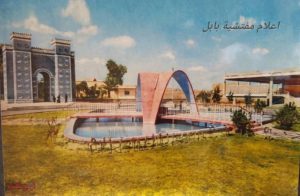 In 1978, the Iraqi government, under Saddam Hussein, started to rebuild the ancient city. A postcard from the 1970s shows that it was to be a national jewel and home to Hussein’s palace. During and after the Iraq war, it was taken over by occupying troops.
In 1978, the Iraqi government, under Saddam Hussein, started to rebuild the ancient city. A postcard from the 1970s shows that it was to be a national jewel and home to Hussein’s palace. During and after the Iraq war, it was taken over by occupying troops.
God’s word is true; therefore, aspects of the prophecy must be pointing to a future destruction of Babylon, such as what is described in the Book of Revelation Chapter 18.
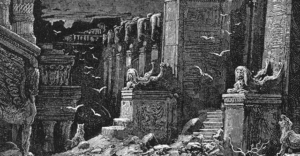 Jeremiah 50:39-40 39 “Therefore the desert creatures will live there along with the jackals; The ostriches also will live in it, and it will never again be inhabited or dwelt in from generation to generation. 40 “As when God overthrew Sodom And Gomorrah with its neighbors,” declares the LORD, “No man will live there, nor will any son of man reside in it.
Jeremiah 50:39-40 39 “Therefore the desert creatures will live there along with the jackals; The ostriches also will live in it, and it will never again be inhabited or dwelt in from generation to generation. 40 “As when God overthrew Sodom And Gomorrah with its neighbors,” declares the LORD, “No man will live there, nor will any son of man reside in it.
Revelation 18:10b, ‘Woe, woe, the great city, Babylon, the strong city! For in one hour your judgment has come.’
In Revelation 18, the Apostle John references Jeremiah’s prophetic word when he describes the destruction of Babylon, informing us that in one hour, she will be made desolate. That great city will be ‘thrown down’ and ‘shall be found no more at all’ (Revelation 18:21). Heaven’s word and heaven’s cause will be avenged (Revelation 18:20).
TODAY’S READING FROM THE NEW TESTAMENT – TITUS 1:1-16
 Titus was one of the Apostle Paul’s trusted co-workers. We read of Paul traveling with Titus to Jerusalem (Galatians 2:3) and to Crete (Titus 1:5). When Paul gives his last instruction to Timothy (which we read yesterday), he lets Timothy know that Titus has gone to Dalmatia (2 Timothy 4:10). Paul saw Titus as a reliable leader who could handle difficult situations.
Titus was one of the Apostle Paul’s trusted co-workers. We read of Paul traveling with Titus to Jerusalem (Galatians 2:3) and to Crete (Titus 1:5). When Paul gives his last instruction to Timothy (which we read yesterday), he lets Timothy know that Titus has gone to Dalmatia (2 Timothy 4:10). Paul saw Titus as a reliable leader who could handle difficult situations.
Paul leaves Titus in Crete to appoint elders/pastors/overseers. The words for elder, pastors, and overseers are used interchangeably to describe Spirit-given leaders in the local church; (Titus 1:5; Acts 20:28). God’s plan is for a plurality of elders to shepherd the local flock. In Titus 1:5, Paul commands Titus to appoint “elders” (plural).
Paul’s salutation is full of gospel truth (Titus 1:1-4). The gospel is ‘the truth’ of the finished work of Jesus Christ. God commanded Paul to preach it. The preaching of the word would effect a transformation in the lives of God’s elect and bring forth the certain hope of eternal life. The gospel promise was established before the beginning of time and comes from a God who cannot lie (1:2).
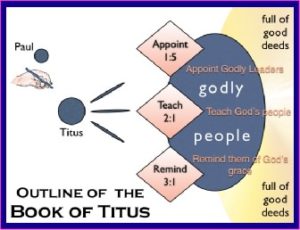 Paul describes the necessary qualifications that Titus needs to look for in the men he is to appoint as elders in Crete. Notice that they are similar qualifications to what we read in 1 Timothy Chapter 3. They all have to do with CHARACTER, rather than CHARISMA. All of these qualities are to be sought after in the lives of all believers and are signs consistent with spiritual maturity. The only characteristic that distinguishes elders from deacons would be the ability to teach, encouraging the flock in sound doctrine and refuting those who oppose it.
Paul describes the necessary qualifications that Titus needs to look for in the men he is to appoint as elders in Crete. Notice that they are similar qualifications to what we read in 1 Timothy Chapter 3. They all have to do with CHARACTER, rather than CHARISMA. All of these qualities are to be sought after in the lives of all believers and are signs consistent with spiritual maturity. The only characteristic that distinguishes elders from deacons would be the ability to teach, encouraging the flock in sound doctrine and refuting those who oppose it.
 The elders must be able to handle confrontation and be able to rebuke and silence those who are deceiving others and causing damage to entire households (Titus 1:11).
The elders must be able to handle confrontation and be able to rebuke and silence those who are deceiving others and causing damage to entire households (Titus 1:11).
Paul is aware that there are many who profess the faith yet do not possess the faith. What you believe will be evident in how you behave.
Titus 1:16 16 They profess to know God, but by their deeds they deny Him, being detestable and disobedient and worthless for any good deed.
TODAY’S READING FROM THE BOOK OF PSALMS – PSALMS 97:1- 98:9
The Lord is to be praised. Righteousness and justice are foundational to His kingdom. We give witness to our belonging to His kingdom by the way we live- seeking to live as His royal subjects and making the pursuit of His interests our life’s priority.
Psalm 97:1-2 1 The LORD reigns, let the earth rejoice; Let the many islands be glad. 2 Clouds and thick darkness surround Him; Righteousness and justice are the foundation of His throne.
Matthew 6:33 33 “But seek first His kingdom and His righteousness, and all these things will be added to you.
Our natural hearts are given to idolatry. John Calvin wisely observed that the human heart is an ‘idol-making factory’. Any form of covetousness is idolatry (Colossians 3:5). Serving any goal higher than pleasing our King, is also considered idolatry.
We have our ‘American idols’ and our ‘celebrity idol’s. Our pursuits and sports can become idols. Our possessions, our family, and friends can be idols. So can our ministries. Anything that takes the place of God as the central concern in our lives becomes an idol.
Psalm 97:7 7 Let all those be ashamed who serve graven images, who boast themselves of idols; Worship Him, all you gods.
Psalm 97:9 9 For You are the LORD Most High over all the earth; You are exalted far above all gods.
Psalm 97:10 10 Hate evil, you who love the LORD, Who preserves the souls of His godly ones; He delivers them from the hand of the wicked.
This psalm describes well what it means to be filled with the Holy Spirit (See Ephesians 5:18-19). The grace of God teaches us to deny ungodliness (97:10). The Holy Spirit enlightens our understanding (97:22) and fills our hearts with a desire to speak to one another with psalms, hymns, and spiritual songs (97:12)
Psalm 98 is a fitting follow up song! What a solid call to worship!
Psalm 98:1 1 O sing to the LORD a new song, For He has done wonderful things, His right hand and His holy arm have gained the victory for Him.
Psalm 98:9 9 Before the LORD, for He is coming to judge the earth; He will judge the world with righteousness and the peoples with equity.
TODAY’S READING FROM THE BOOK OF PROVERBS- PROVERBS 26:13-16
Proverbs 26:13-16 13 The sluggard says, “There is a lion in the road! A lion is in the open square!” 14 As the door turns on its hinges, so does the sluggard on his bed. 15 The sluggard buries his hand in the dish; He is weary of bringing it to his mouth again. 16 The sluggard is wiser in his own eyes Than seven men who can give a discreet answer.
There are always excuses for not taking a risk to do the right thing. The lazy do not follow through.
PRAY FOR THE NATIONS – SLOVAKIA
Slovak Republic
Europe
Geography
Area: 49,035 sq. km
Landlocked central European state, ranging from fertile Danube shores to the Tatra Mountains.
Population: 5,411,640 Annual Growth: 0.10%
Capital: Bratislava
Urbanites: 56.8%
HDI Rank: 42 of 182 (UN Human Development Reports 2009)
Peoples
Peoples: 20 (5% unreached) All peoples
Unreached Peoples Prayer Card
Official language: Slovak Languages: 13 All languages
Religion
Largest Religion: Christian
|
Religion |
|
Pop % |
Ann Gr |
|
5,051,225 |
93.34 |
0.0 |
|
|
67,163 |
1.2 |
1.9 |
Challenges for Prayer
Appropriate training for both leaders and believers is essential. The Slovak Evangelical Alliance’s program that trains laity for church planting has now graduated over 140 people. The collaboratively run Bible school and seminary in Banska Bystrica (KETM) is crucial for preparing pastors, evangelists, Christian teachers for schools and such, but wisdom regarding accreditation is needed. Shorter training programs are run by SIET, the Baptists, and a number of others. Pray that the cumulative effect of these programs would be a new generation of well-trained, godly leaders.
Less-reached peoples:
a) Hungarians make up more than 10% of the population. Tensions persist over minority rights and language use; pray for fair and just solutions. A Hungarian-specific political party enjoys strong support from this community. Most Hungarians are Catholic, but with a number of Reformed congregations and a few evangelical groups. Pray that Hungarian Christians may be mobilized to reach their kin in Slovakia.
b) The Romani (Gypsies) are usually misunderstood and marginalized and suffer from low education and a high level of poverty – but they are the most responsive people to the gospel in all Central and Eastern Europe. Persistent efforts to reach them overcame resistance and now see encouraging responsiveness. Pray for those reaching out to them, for love that will overcome all barriers and stereotypes.
PRAYER: O Lord God, You are King of the Nations! You have crowned Your Son as Lord of all. Grant to the people repentance and faith, turning hearts from their idols to You, the author of this great plan of salvation. We pray that Your Holy Spirit would bring conviction of sin, the need for Your righteousness, and deliverance from their captivity to the prince of this world, whose days are numbered. We ask for a spiritual awakening, and may it begin with us. Thank You for the ministry of the local church. We pray that You would strengthen its leaders and nourish the flock through the ministry of Your Word. In Jesus’ Name. Amen.
-Pastor David


